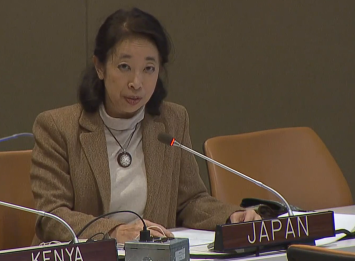女性・平和・安全保障に関する平和構築委員会(PBC)大使級会合における志野大使ステートメント
令和4年12月13日

Thank you, Chair, for organizing this meeting. I also thank the briefers for their valuable insights.
Japan hosted the 6th World Assembly for Women (“WAW!”) earlier this month. The WAW! had a dedicated session on the Women, Peace, and Security (WPS), where distinguished panelists discussed how important and essential women’s participation is. Inspired by the outcome of the WAW!, I would like to share some ideas on how we can strengthen our commitment to mainstreaming the WPS agenda in the areas of peacebuilding, including prevention and peacekeeping.
First, we should make further efforts to invest in women for their leadership role on the ground. The Senior Women Talent Pipeline is a good example to promote the participation of women in decision-making processes within UN peace operations, as I believe that increasing the recruitment of women leaders should start from within UN peace operations themselves. These female UN officers can be ideal role models who can further encourage women in beneficiary countries to play an active role in peacebuilding. Japan plays its part by sending a female staff officer to UNMISS. In order to accelerate the impact, the PBC should more actively invite women peacebuilders, such as UN female officers in peace operations and women activists from civil society, to engage in discussions on peacebuilding.
Second, UN peace operations should strengthen their support for institution-building under inclusive ownership, especially regarding host state rule of law institutions. The establishment of an inclusive and non-discriminatory security sector is a crucial foundation for building and sustaining peace. As UN peace operations further expand their policing and judicial dimensions, they can play a greater role in supporting the building of those institutions by making sure they reflect WPS perspectives. Such efforts will encourage a smoother transition towards sustainable peace after the mandate of a UN peace operation has ended.
Third, the PBC’s convening power and advisory role should be further utilized in order to improve planning and delivery of peacebuilding activities by UN peace operation. By design, the PBC is expected to provide a venue to bring all relevant actors together for transition planning, and pursue early engagement towards peacebuilding. In this context, the Security Council should more actively request the PBC’s advice, especially on how to incorporate peacebuilding planning and support into UN peace operations’ mandates. As an incoming member of the Security Council, Japan remains committed to promoting the WPS agenda through close cooperation between the PBC and the Security Council.
In conclusion, let me assure you of our continuous commitment on this topic.
I thank you.
